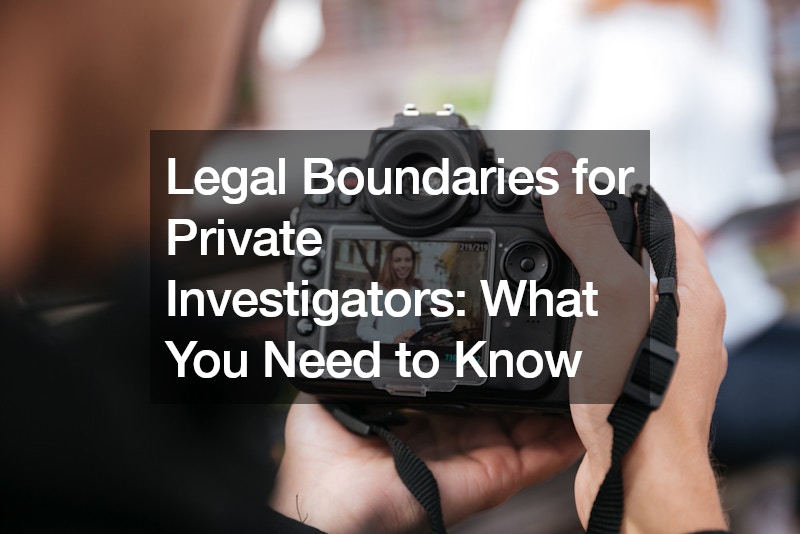Private investigators (PIs) often occupy a shadowy space in the public imagination. In movies and television shows, they’re portrayed as trench coat-clad figures who tail cheating spouses and crack wide-open criminal conspiracies. While PIs do play a role in uncovering the truth, the reality of their work is far more grounded in legalities and ethical considerations. This article explores the legal boundaries that define what private investigators can and cannot do.
Firearms and Force
The image of a private investigator packing heat might be a Hollywood trope, but in some cases, it reflects reality. Many states allow PIs to carry firearms, but with significant restrictions.
Typically, a PI must possess a concealed carry permit, just like any private citizen. Additionally, most states require PIs to obtain a special license specific to their profession. This license often involves additional training in firearm use, safety protocols, and legal guidelines surrounding when deadly force can be used.
It’s important to remember that PIs are not law enforcement officers. They cannot make arrests unless they witness a crime in progress and are performing a citizen’s arrest. Their primary function is to gather information, not apprehend suspects.
Surveillance and Privacy
A core function of private investigators is conducting surveillance. This can involve following someone in public places to observe their activities, recording their movements, or taking photographs. However, there’s a fine line between legitimate surveillance and illegal stalking. PIs must be mindful of not invading someone’s reasonable expectation of privacy. This means they cannot trespass on private property, peek into windows of homes or offices, or use sophisticated equipment to eavesdrop on private conversations.
Respecting Recording Laws
In today’s digital age, recording conversations can be a valuable tool for PIs. However, the legality of recording conversations depends on the state’s specific laws. In most states, a two-party consent rule applies. This means that both individuals involved in a conversation need to be aware of and agree to the recording. There are exceptions, however, in some one-party consent states where only one person’s knowledge is required. Regardless of the state law, PIs should always be transparent about recording conversations and obtain consent whenever possible.
The Limits of Technology
Technology plays a significant role in modern investigations. However, PIs cannot use technology to violate the law. This means they cannot hack into someone’s computer, phone, or email account. Similarly, placing a GPS tracker on someone’s car without their knowledge is illegal.
Finding Hidden Assets
A common task for PIs is locating hidden assets in financial investigations. This can involve uncovering secret bank accounts, real estate holdings, or other financial resources. While what private investigator legally do includes finding hidden assets, the methods used are crucial. PIs cannot engage in illegal activities like document forgery or financial fraud to uncover these assets. They rely on legal methods such as public record searches, data analysis, and interviews to track down hidden wealth.
Questioning and Interrogations
PIs can interview people as part of their investigations. This can involve talking to witnesses, potential suspects, or anyone who might have relevant information. However, PIs are not law enforcement officers, and they cannot detain individuals against their will. Unlike police officers, PIs don’t need to inform people of their Miranda rights, which means the right to remain silent and the right to an attorney. There are also limitations on how PIs can approach someone represented by a lawyer in an ongoing legal case.
Misrepresentation and Deception
While PIs can use some pre-text to initiate a conversation with someone, they cannot use deception to obtain private information. For example, a PI cannot pretend to be a representative of a bank to trick someone into revealing their account details.
Badges and Identification
Unlike police officers, PIs don’t carry badges that resemble law enforcement badges. Their IDs are designed to clearly distinguish them from police officers. This is because PIs don’t have the same authority as law enforcement and shouldn’t be mistaken for such.
The Importance of Legality and Ethics
Understanding legal boundaries is crucial for PIs. Operating outside the law can lead to serious consequences, including fines, jail time, and even lawsuits. But legality is just one piece of the puzzle. PIs also have a professional and ethical obligation to conduct their investigations in a responsible manner. This means respecting privacy rights, avoiding entrapment, and ensuring the information they gather is obtained legally.
Hiring a Private Investigator
If you’re considering hiring a PI, it’s important to choose someone who is licensed, insured, and reputable. Ask about their experience and expertise in your specific area of concern. Most importantly, discuss the legality of the investigation and ensure the PI understands and respects the boundaries of what they can and cannot do.
.


